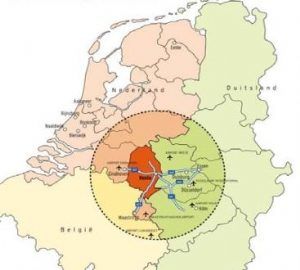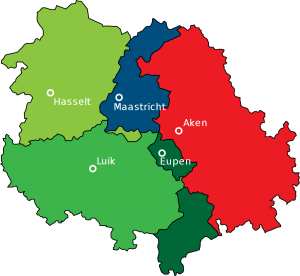Euregio What Is It?
The Euregio, or European Region, is a cross-border cooperation between Germany and the Netherlands. That is the official initiative that was started in 1958 by the Germans. You can read more about it here.
This 1.30-minute video explains it a bit more (Dutch & German language).
Geographically and/or officially, it only covers the border area of the South of the Netherlands and the adjacent German territory. In practice, though there are many efforts undertaken to also involve the Dutch and French-speaking Belgian provinces into the cooperation.
So, all in all, there are three countries involved: Germany, the Netherlands, and Belgium.
Below are two images illustrating the geographical area’s involved in the Euregio


The initiative of this Euregio is primarily sponsored by the European Commission to facilitate cross-border labor and business.
In 1987 another body as found called Interreg. You can find out more about that here. Even after reading the Wikipedia page on the Euregio several times, it wasn’t clear to me what their intentions were, other than receiving funds from the European Commission.
Why It Is a Waste of Money?
In and by itself these initiatives make good sense of course. However, as very often in the case of these inter-European or cross-border cases, there is very little consideration of the cultural differences involved:
The German, Belgian, and Dutch cultures differ significantly from each other. But there seems to be no (not even a little) eye for this. Not even on the website of the Euregio itself (click here to go there). The website is in German and Dutch. English is available, but many articles are not even translated into English.
The website itself only goes as far as mentioning that the labor laws are different in other countries and that certain rules and regulations can also differ.
Here is an overview of the differences on the first four primary dimensions of culture between the three countries (if you’re not familiar with those dimensions you can read more about them here):
| Hierarchy | Loyalty | Goal Orientation | Predictability | |
| Germany | 37 | 65 | 67 | 68 |
| The Netherlands | 34 | 81 | 17 | 50 |
| Belgium | 64 | 77 | 56 | 89 |
As you can see, there are big differences between these three countries.
So only stating that some rules and regulations can be different is missing the point. Completely.
And why, you might ask, is the money put in by Brussels wasted?
One of the reasons is that the cultural differences are completely overlooked. Without addressing these (first!) the Euregio is doomed to fail.
The other is the fact that Brussels is just too darn complicated and bureaucratic. Below is a quote of what Interreg does to help this Euregio (don’t bother to read it. It’s depressing)
“The EUREGIO was thus granted an important role in the administrative procedures for Interreg-supported projects. All project proposals are collected by the secretariat where a first preselection is made based on the basis of the EUREGIO’s own criteria, the general Interreg requirements and the prevailing legislation for the territories of the member authorities. The strict EUREGIO criteria require all projects to have a genuine cross-border character in substantial, organisational, personal and financial respects. As the relevant agreement states, projects must relate to a ‘Euregional interest’, linked to a structural and socio-economic significance for the region (EUREGIO and Rhein-Ems 1996: 29).
The approved proposals are submitted to the Steering Committee which is the highest instance in Interreg decision-making. As with the other Euroregions on the Dutch-German border, for the EUREGIO a separate SC has been established. Apart from the EUREGIO representatives, the Committee is composed of senior civil servants representing the following authorities: the Dutch ministry for Economics, and the provinces Drenthe, Overijssel and Gelderland on the Dutch side, and the Ministries of Economics of the German Länder NRW and Lower Saxony as well as the Bezirksregierungen Münster and Weser-Ems on the German side.”
See what I mean? Rules, rules, rules, and more rules. Causing delay after delay after delay. Resulting in… nothing!
Language Differences?
What about the differences in languages? Yes, those are there as well. But the fact that the French-speaking Belgians followed by the Germans have the lowest level of English is also explainable by the differences in culture (mainly by their high score on the Predictability dimension).
I once did a workshop for the Chamber of commerce in Liège (French-speaking part of Belgium). I did this workshop in English having to stop every other moment for translation into French.
But, and this is good news, it is getting better. The levels of English overall are improving. Albeit slowly.
The Euregio Potential
The Euregio region certainly has potential. Very close to each other are the cities of Maastricht, Aachen, Liège, Hasselt, Köln. And within a 2-3 hours drive radius, there is Brussels, Amsterdam, and you’re closing into Frankfurt.
Lots of people. Lots of infrastructures. Lots of potentials.
But unfortunately, since its inception in 1958 and after millions of Deutch Marks, Guilders, and Euro’s there is still very little business in the area in relative comparison with its potential.
How to Make it Work?
Ok. Enough of the nagging and bad news.
How do you get it to work? The two factors that make the most sense to address are:
- Language. And the language to go for would be English. Not any of the other local languages. Why? Because no matter what, in this part of Europe and the rest of the continent, the binding language is and will be English. Invest in that. Start early and keep at it.
- Understanding each other’s cultures. Language first, culture second. Differences in rules and regulations per country have never caused a business transaction to fail. Not understanding the culture had. Time and again.
Want to Know More?
If you want to know more about how I can make you better when you work internationally, get in touch with me.
An article on international project management can be found here.
A dedicated post on the Belgian management style can be found here.
Get a Taste of How Chris Presents, Watch his TEDx Talk
 Call Direct: +32476524957
Call Direct: +32476524957
 European Office (Paris) Whatsapp: +32476524957
European Office (Paris) Whatsapp: +32476524957
The Americas (USA; Atlanta, GA; también en Español): +1 678 301 8369
Book Chris Smit as a Speaker
If you're looking for an Engaging, Exciting, and Interactive speaker on the subject of Intercultural Management & Awareness you came to the right place.
Chris has spoken at hundreds of events and to thousands of people on the subject of Cultural Diversity & Cultural Competence.
This is What Others Say About Chris:
- “Very Interactive and Engaging”
- “In little time he knew how to get the audience inspired and connected to his story”
- “His ability to make large groups of participants quickly and adequately aware of the huge impact of cultural differences is excellent”
- “Chris is a dedicated and inspirational professional”
In addition, his presentations can cover specific topics cultural topics, or generally on Cultural differences.
Presentations can vary anywhere from 20 minutes to 2 hours and are given worldwide.
Book Chris now by simply sending an email. Click here to do so.
Read more about what Chris can do for you.
- Percentage of People Rating a Presentation as Excellent 86%
- Rating the Presentation as Practical 89%
- Applicability of Chris' presentation 90%
About Peter van der Lende

Peter has joined forces with Culture Matters.
Because he has years and years of international business development experience joining forces therefore only seemed logical.
Being born and raised in the Netherlands, he has lived in more than 9 countries of which most were in Latin America.
He currently lives in Atlanta, Georgia (USA) with his family.
You can find out more at https://expand360.com/
Or find out what Peter can do for you here.
- 198 Cultural Differences and Government with Maria Paula Correa - 18 November 2025
- 197 Product Sourcing in China with Omer Sasson - 7 November 2025
- 196 Cultural Differences with Sarah Williams - 28 October 2025

 Call Direct: +32476524957
Call Direct: +32476524957 European Office (Paris) Whatsapp: +32476524957
European Office (Paris) Whatsapp: +32476524957
Wow…what a load bullshit…i.e. the regional dialect in Herzogenrath and Kerkrade is the same…Obviously you don’t know a lot about either the region or how pronounced the differences really are. Not much tbh. and all my dutch and belgian colleagus have the same view. living here is crossing the border on a daily basis. We work in all three countries and the Euregio culturally ties that together. There is a joint police station and the overall cooperation between the three countries is unmatched europe and nearly worldwide. Maybe instead of recounting a few numbers from three vague categories from some poll….you visit the region and talk to the People and firms there…Nobody here neither in Germany nor in Netherland or Belgium shares that opinion…
Your Analysis just reeks of a lack of experience and feels very fabricated to construct some vague point of critique against brussels or so…. nowhere in europe are the cultural differences less pronounced than here. And not since officially calling it Euregio, but for decades before…laughable…
Hi,
I like your name and email address.
Evidently not someone who is willing come forward with a real man.
Nor will you specify your claims, nor your numbers.
How many is “all my Belgian colleagues”?
“Nobody here neither in Germany nor in Netherland or Belgium shares that opinion…” numbers please (you probably can’t).
You begin your unjustified comment by saying (quote: “Nobody here neither in Germany nor in Netherland or Belgium shares that opinion…”
And then you end it with: “nowhere in europe are the cultural differences less pronounced than here”.
Nicely done.
Change your email address into something more mature and do your research like I do, did, and will do.
The Euregio is not exactly Silicon Vally, is it?